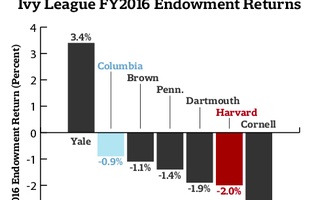Finance experts say that despite both domestic and international market volatility, the Harvard Management Company, which manages the University’s $35.9 billion endowment, should stay its course and not make drastic changes to investment portfolio.
Steven N. Kaplan ’81, a professor of finance at the University of Chicago Booth School of Business, said that in times with rapidly changing prices and unexpected turns, it would be unwise for a large-scale financial institution to change course.
“The worst thing you can do when there is volatility is panic and change what you are doing,” Kaplan said. “So I would basically just ignore what has happened over the last couple of months as long as I was confident that I had the right asset allocation and the right amount of diversification. Just ignore it.”
David L. Yermack ’85, professor of finance at the New York University Stern School of Business, echoed Kaplan’s comments, emphasizing the importance of minimizing risk in all possible forms for the guaranteed long-term health of the University.
“It’s inevitable that you will have volatility in the market, but an investor as large as HMC should really be a buy-and-hold investor, not try to trade around that,” Yermack said. “There is no real strategy to outrun something that is just in the nature of investing in stocks and bonds.”{shortcode-ef6ec4d68007ea1297ae27c512dfebbb2d8cbde5}
In its current model, HMC, led by CEO Stephen Blyth, manages risk through what it calls its Policy Portfolio, or a defined allocation of where the Company will invest. Every year in September, the Management Company announces the Policy Portfolio for the upcoming fiscal year, with changes to the asset allocation breakdown explained by CEO of HMC.
The upcoming report from HMC will be Blyth’s first as CEO. He took over in January from Jane L. Mendillo, who led HMC through the crisis but struggled to return the fund’s returns to the top of the pack.
Kaplan suggested that HMC has overreacted to volatility in the past, particularly during the 2007-2009 financial crisis.
“If you go back to the financial crisis in late 2008 and early 2009? They panicked and sold equity,” Kaplan added. “That was the worst time to sell equity because the equity markets have done extremely well since then.”
When the markets fell off, HMC was unable to provide enough liquidity to give full support to all of Harvard’s budgets. Even despite the emergency cost-cutting measures undertaken by Harvard deans, HMC’s liquid assets—or assets that can quickly be exchanged for cash—were insufficient. This forced HMC to start selling off some of its long-term illiquid assets, such as private equity and real estate investments, at the bottom of the market. In 2009, HMC saw endowment returns of negative 27.3 percent, a value of roughly $11 billion.
Five years removed from the crisis, HMC is still a player in private equity, and its place in the portfolio has only increased. Its fiscal 2015 allocation to the asset class was 18 percent, up from 16 percent in fiscal 2014 and 11 percent in fiscal 2008, on the eve of the crisis.
“We believe that targeted and judicious exposure to [private equity] can lead to higher returns; and ... while the portfolio experienced liquidity constraints over the past five to six years, the liquidity profile of the endowment is now improved, allowing us to strategically increase our position in illiquid assets,” Mendillo wrote in the September 2014 annual endowment report, her last in charge.
While Kaplan, a private equity expert himself, said that the private equity market is healthy if somewhat saturated, Yermack expressed concern about the increased commitment to private equity investments and the heightened risk that goes along with it.
“I think that private equity is something of a racket. Managers do very well in terms of the fees that they collect but their ability to choose good investments is not particularly impressive,” Yermack said. “So I don’t think HMC or any other endowment should be giving money to private equity, if any.”
With the September 2015 endowment report due for release soon, Blyth will put his firmest public stamp yet on HMC’s direction, determining its plan for the upcoming year and addressing not only private equity but also the lingering speculation over when the Federal Reserve will raise interest rates.
—Staff writer William C. Skinner can be reached at wskinner@college.harvard.edu. Follow him on Twitter @WSkinner.
Read more in University News
Department of Education Releases Finalized College 'Scorecard'Recommended Articles
-
Five Questions Facing Harvard AthleticsIt all started right here, on the Charles River. The very first intercollegiate athletic competition occurred when eight men donned
-
GWOGraduate Women's Organization: General Meeting tonight, 8:15 p.m., Boylston Hall auditorium. All graduate women invited to come and participate in
-
LAW SCHOOL EXAMINATIONS.Contracts, Monday, June 4. Constitutional law and conflict of laws, Monday, June 4. Real property, second year, Tuesday, June 5.
-
 With Narvekar’s Appointment, Seeds of Change at HMC
With Narvekar’s Appointment, Seeds of Change at HMC -
HMC to Unload Private Equity AssetsHarvard Management Company—the firm managing Harvard’s $35.7 billion endowment—is nearing the final stage in talks to sell over $2 billion in private equity and real estate assets to Lexington Partners.













